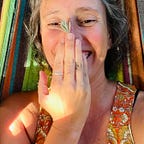“Burning October carries the devil in its womb.”
Boreal Autumn
The origin of the word “Autumn” as a phase of the year is debatable. It comes from tempus autumnus, possibly “sunset time.” It contains the idea of sunset, fall, decline, ruin, or the end of the long sunny days heading towards winter’s rigors.
We now glimpse the fog of old age, the ripening of fruit and life, dry leaves falling, and the icy winds of long winter nights. It’s a frontier time, a threshold of transition into the shadow of the cold night. The necessary detachment for the descent hurts but also brings us back.
The Autumnal Equinox — aequus “equal” + nox “night” — when Hades abducts Persephone to the underworld, and the peninsular goddess Atégina surrenders herself to the black, nourishing ground of Endovelicus, is the time of the harvest. We are preparing for the rigors of winter.
Traditionally, from August to October, many mythical calendars speak of this process of reflection, surrender, and abundance in the Northern Hemisphere — the boreal autumn.
Among the Greeks, we have Xarpo (Carpo or Karpo), the goddess of autumn and the harvest. Her sisters, Thallus and Auxo, were the goddesses of spring and summer. While the three sisters assisted Aphrodite, Xarpo was responsible for the ripening of the crops. The Festival of Dionysus also takes place at this time, with the harvesting of the first fruits and wine, and its ecstatic rituals.
There is the Celtic Mabon, associated with the deity of the sun. The Welsh Mother Goddess of the Earth and the possible Gaulish goddess Dea Matrona are personified in the Celtic goddess of autumn, harvests, and magic, Modron, the mother of the Romano-British god Maponos, whose name means “Great Son.” Modron is the goddess of harvest and fertility, bringing grains, nuts, leaves, acorns, wreaths, apples, grapes, wine, gourds, cornucopia, marigolds, the double spiral, hops, fennel and mushrooms.
🍂 But the old Portuguese weather saying warns:
“Burning October carries the devil in its womb.” Bringing greater challenges for the following spring, more dryness and less lush plants. If the cold doesn’t come, spring fruits won’t grow. When we embrace that many old myths and adages speak of intergenerational eco-systemic wisdom, cartographing the complex cyclical weather patterns mythically, and the seasonal shifts collected over millennia, we better understand the warnings and dangers of apparently small casualties.
How factual is this archaic warning for a country like Portugal, now constantly ravaged by fires and severe, endless droughts?
